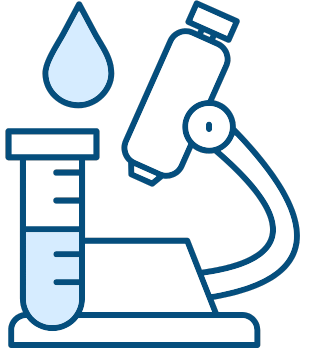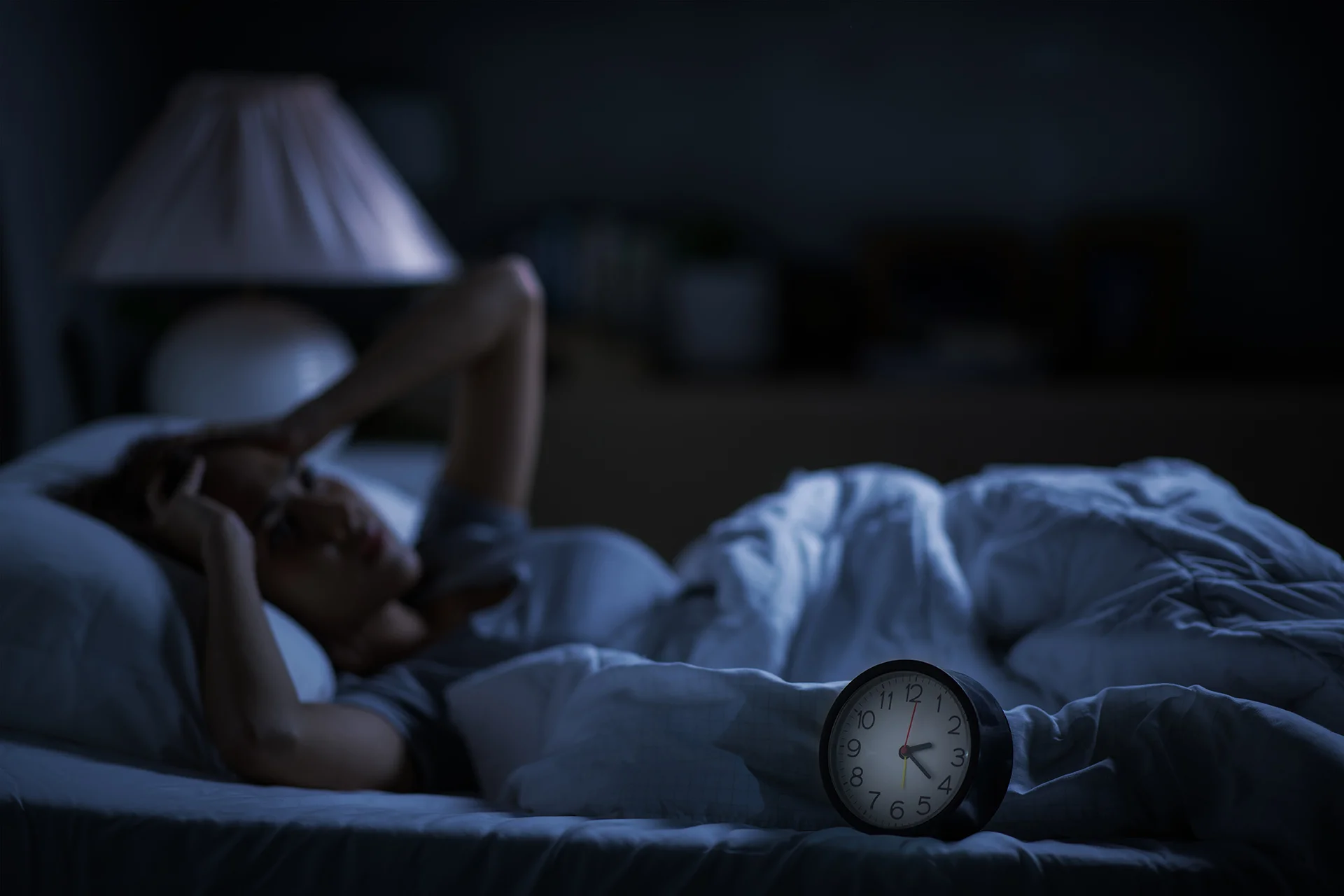Insomnia affects a large proportion of the world’s population. Statistics show that around 30-40% of adults have experienced at least one episode of insomnia, while around 10-15% of people suffer from chronic insomnia. It is a pressing problem that can affect not only sleep, but also quality of life and overall health.
Insomnia is a complex phenomenon caused by a variety of factors ranging from emotional stress to physical activity. In this article, we will take a closer look at this disorder together with our specialist clinicians. We will discuss how the quality of sleep can be influenced by our lifestyle or diet, and what other reasons it can occur. In addition, we will look at possible treatments for insomnia. Only by understanding the causes of insomnia and knowing how to combat it can we improve our sleep quality and health..
Symptoms of insomnia
Insomnia is an insidious disorder that can manifest itself in many ways. Most often, the effects of insomnia are seen during the day. Here are some of the most common symptoms of insomnia:
1. Difficulty falling asleep
This is the main sign of insomnia. It can manifest itself in many different ways: it can make it difficult to fall asleep quickly after getting into bed, or impossible to fall asleep at all. Often this is accompanied by anxiety about whether you will be able to fall asleep. This symptom is often one of the first signs a person notices. It can be very distressing and can lead to a range of further problems.
2. Frequent awakenings
Insomnia is also almost always caused by frequent awakenings during the night. Insomnia sufferers do not reach a deep sleep phase, so they can be woken up by any noise, light or even for no apparent reason. Sometimes, he does not even notice these brief awakenings. This not only interferes with sleep but also causes general discomfort at night.
3. Not resting
This symptom of insomnia is actually a consequence of the symptoms that preceded it, often occurring in the morning or during the day. Without sleep and rest, the person feels unwell, tired and has difficulty concentrating. Lack of quality sleep and persistent fatigue can have long-term effects on a person’s physical and mental health.
4. Daytime sleepiness
Daytime sleepiness is a common and fairly frequent symptom of insomnia caused by lack of sleep at night. It can lead to reduced performance, difficulty in studying or performing daily tasks.
5. Irritability and anxiety
Long-term insomnia can affect a person’s emotional health. It can make you irritable, restless and angry about small things. It can also cause anxiety. It can affect relationships and communication with people close to you. Emotional symptoms can also exacerbate insomnia itself.
6. Fear
People with insomnia often start to fear the consequences of insomnia. They may worry too much about how they will feel, whether they will be able to get things done, or whether they will be able to fall asleep at night. This fear can lead to psychological stress and further aggravate the sleep disorder.
Insomnia does not always manifest itself in the same way. One night you may find it difficult to fall asleep, the next night you may wake up, and the next night you may spend the whole night without experiencing any symptoms. This variability in insomnia symptoms can be extremely confusing and even more frustrating.
Insomnia is diagnosed when a person does not fall asleep for more than 30 minutes, wakes up frequently or sleeps for less than 6 hours, and the symptoms of insomnia recur more than three times a week for at least one month.
If you have been unable to fall asleep for some time, if you keep waking during the night, if you get up in the morning without resting, and if you feel very sleepy and have difficulty concentrating during the day, you may be suffering from insomnia. If you notice that these symptoms are becoming chronic and you are finding it difficult to lead a normal life, it is important to seek medical advice from a doctor or sleep disorder specialist. A professional can help you identify the causes of insomnia and help you regain the quality of your sleep.
How is insomnia diagnosed?
Identifying insomnia is an important step towards understanding and resolving this sleep disorder. The identification process usually involves a number of key steps.
Insomnia is most often identified by questioning. Your doctor may ask:
- What is the most frustrating thing for you in the current period.
- How many times a night do you wake up and what are the reasons for this.
- When do you wake up and get up in the morning.
- Do you follow sleep hygiene rules (e.g. what you do a few hours before going to bed).
- What worries and experiences bother you.
- What kind of work you do (e.g. shift work or physically demanding work).
Additional tests such as specific sleep and psychological tests and polysomnographic sleep studies carried out in sleep disorders laboratories are also available to assess sleep patterns, sleep and wake times, number and duration of awakenings, sleep duration and phase changes.
Your doctor may also suggest the use of a sleep diary to help you track the quality of your own sleep. Your nightly sleep time would be tracked daily for a period of one to several weeks.
What are the types of insomnia?
Insomnia can be divided into several categories, depending on how long it lasts and its origin:
Occasional (temporary) insomnia
Such insomnia lasts only a few nights or for a very short period of time, and is usually related to some short-term external circumstances or stressful situations. Such insomnia may be caused by travel (time zone differences), changes in work or personal matters. When these circumstances change, the insomnia usually disappears.
Short-term (comorbid) insomnia
It usually lasts less than a month and is linked to external factors or stressors. This could be persistent emotional stress due to the loss of a loved one, a job loss or other short-term significant life events. This type of insomnia can develop suddenly.
Chronic (long-term) insomnia
Chronic insomnia is diagnosed when it lasts more than 1 month. Chronic insomnia falls into two main categories:
a. Primary insomnia. This is insomnia for which there is no apparent cause. It manifests itself as an independent sleep disorder.
b. Secondary insomnia. Secondary insomnia is symptomatic. It is caused by medical or mental illness or other health problems. This insomnia may be associated with pain, physical or psychological disorders. Secondary insomnia also includes insomnia caused by alcohol or drug use.
Due to its different types and causes, insomnia can require a personalised approach to treatment. In order to determine the right treatment plan, it is important to identify exactly which category of insomnia the patient belongs to and the causes of the disorder.
Causes of insomnia
Insomnia can be caused by a variety of reasons. The most common are:
- Random factors: these can be related to the bedroom – too low or high a room temperature, too much light or noise. People sleeping in a new place may also experience insomnia. Changes in time zones or work rhythms can also interfere with falling asleep.
- Stress: intense emotional experiences, such as the death of a loved one or the loss of a job, can affect sleep quality.
- Excessive physical or emotional fatigue: during physical work or intense emotional stress, the body may have difficulty relaxing.
- Not maintaining good sleep hygiene: poor sleep hygiene, such as irregular sleeping hours, intense physical activity or eating just before bedtime, can be a source of insomnia. People who sleep for too long may also have difficulty falling asleep.
- Alcohol and caffeine consumption: too much caffeine can make it difficult to fall asleep at night. Therefore, it should be reduced and caffeine should be avoided a few hours before bedtime. Abuse of alcohol or other addictive substances also contributes to insomnia.
- Emotional stress: Emotional stress related to work, family or other aspects of life can cause insomnia. Constant anxiety and strained relationships can interfere with achieving deep sleep.
- Medicines: taking certain medicines (e.g. antidepressants, anticonvulsants, anti-inflammatories, painkillers for cardiovascular disease, pulmonary drugs, psychostimulants) can make it difficult to fall asleep. Stopping certain drugs, such as benzodiazepines, too abruptly can also cause insomnia.
- Psychological disorders: insomnia can occur in a variety of mental illnesses, such as depression, bipolar disorder (with both depressive and manic episodes), anxiety disorders, eating disorders, schizophrenia or psychoses of other origins, a variety of personality disorders, and alcohol dependence.
- Illnesses: some illnesses may interfere with sleep. These may include various neurological (Parkinson’s disease, other neurodegenerative diseases, epilepsy, vascular disorders, Alzheimer’s disease) or other (cardiovascular, respiratory, renal, endocrine or immune) diseases.
- Other sleep disorders: there are a number of sleep disorders that can also cause insomnia. These may include restless legs syndrome, late sleep syndrome, sleep apnoea or periodic limb movement syndrome. These disorders often require specific treatment.
To tackle insomnia, it is important to identify its source and take appropriate action to improve sleep quality and duration. If you have concerns about insomnia, it is important to seek medical advice to help you find out what is causing it and prescribe the right treatment.
Treatment of insomnia
Insomnia can be extremely distressing and can have detrimental effects on physical and mental health and quality of life.
Long-term insomnia can have particularly serious consequences. In particular, chronic sleep deprivation can affect a person’s cognitive functions, including concentration, memory and perception. This can lead to reduced productivity and poorer job performance. There is a risk of accidents. Around 50% of accidents and 45% of car crashes are related to insomnia.
In addition, the effects of insomnia can manifest themselves on a psychological level, causing mood disorders and depression. Insomnia also increases the risk of alcohol and drug addiction, and long-term sleep disturbance can have negative consequences on the cardiovascular system, hormone levels and the immune system. Insomnia (more than obesity) increases the likelihood of mortality.
Treatment for insomnia can take many forms, depending on the severity of the condition, the causes of insomnia and the needs of the patient. Different treatments can be used individually or in combination with other treatments. Here are some of the ways in which insomnia can be treated:
Changing sleep habits and hygiene
Practicing good sleep hygiene can help improve sleep quality. Follow your sleep routine. Always go to bed and get up at the same time. Establish a bedtime ritual, e.g. walk outside in the evening, air the room before bed, read, take a warm bath. 3-4 hours before going to bed, stop eating.
- Eliminating the cause of sleep disturbance
If you know what is causing your insomnia, you need to eliminate or reduce these causes. It is important to learn how to reduce stress and cope better with worries. If insomnia is caused by comorbid internal, neurological or mental illnesses, these should be treated.
- Psychotherapy
Psychotherapeutic approaches can be very effective in treating insomnia. These may include behavioural therapy, relaxation, stimulus management techniques and cognitive therapy. These methods help the patient to learn to recognise and change habits that may be negatively affecting their sleep. Psychotherapy also looks for ways to help people fall asleep if they have insomnia.
- Light therapy
Light therapy works by regulating sleep-wake rhythms. During the treatment, the patient’s eyes are illuminated with light of at least 2500 lux. The duration of one treatment is 0.5-2 hours. This technique can be effective in the treatment of insomnia associated with time zone disturbances or shift work.
- Medicines
Your doctor may prescribe certain medications to treat insomnia. These may include new-generation selective sleeping pills, benzodiazepines or antidepressants. These drugs are often used only if other treatments are ineffective or in severe forms of insomnia.
- Ozone or intravenous therapy
This is a relatively new and alternative treatment for insomnia. Ozone therapy improves blood circulation and oxygen supply to the body. This can have a positive effect on sleep and energy levels.
Intravenous therapy, which delivers a special cocktail of vitamins and nutrients intravenously, can also improve general health and sleep quality.
The treatment of insomnia should be determined by a qualified doctor, taking into account the patient’s needs and specific circumstances. The doctor may recommend one or more of the above treatments, depending on the patient’s medical condition and the severity of insomnia. The most important thing is to seek professional medical advice if you notice symptoms of insomnia, so that you can start the right treatment and improve the quality of your sleep.
Insomnia is a pressing problem affecting a large proportion of the population worldwide. Prolonged sleep disturbances can severely affect the quality of your entire life. However, it is important to note that insomnia is treatable.
In order to overcome insomnia, it is important to see a doctor and get a proper diagnosis and treatment plan. Healthy, quality sleep is an important indicator of overall health and well-being, so overcoming insomnia is an important step towards better physical and psychological well-being.
If you experience symptoms of insomnia, contact Drops Clinic’s expert team of doctors who are always ready to help you regain your quality of life. Our team is made up of professionals with exceptional skills and qualifications, using only the latest state-of-the-art medical equipment. We work only with certified products from world-renowned manufacturers. After listening to your complaints and preferences, and based on the detailed examinations carried out, our professional doctors will select the most appropriate course of therapy for you.os įrangą. Dirbame tik su sertifikuotais ir pasaulyje pripažintų gamintojų preparatais. Išklausę jūsų nusiskundimus, pageidavimus ir pagal atliktus išsamius tyrimus, mūsų profesionalūs gydytojai parinks jums tinkamiausią terapijos kursą.
Frequently asked questions
What influences sleep quality?
Sleep quality is largely influenced by many factors. The sleep environment where you sleep should be quiet, dark and comfortable. Any physical activity before bedtime will interfere with sleep. Napping during the day also impairs sleep at night.
Do not drink a lot of liquids before bedtime and eat dinner 3-4 hours before bedtime. Avoid alcohol in the evenings and coffee, tea or other caffeinated drinks.
Sleep is also affected by factors such as sleeping position, bed comfort, room temperature, noise and light. Snoring can also reduce sleep quality.
What are the most common causes of insomnia?
The most common causes of insomnia include various psychological aspects such as emotional stress, depression and anxiety. Poor sleep hygiene, poor sleep environment, and physical activity in the evening can all contribute to sleep problems. Certain medications and illnesses can also cause insomnia.
Sometimes, insomnia can be caused by accidental external factors – noise, lights, time zone changes.
How much sleep is optimal for an adult?
For most adults, it is recommended to get between 7 and 9 hours of sleep a night to allow the body to recover and restore energy.
However, each person is unique, so the optimal amount of sleep for everyone may vary slightly. It’s important to find your individual sleep rhythm and maintain it, so that you feel refreshed and energised.




